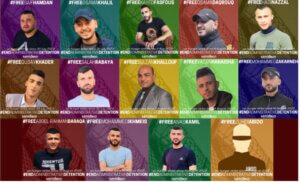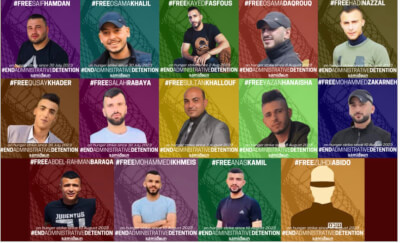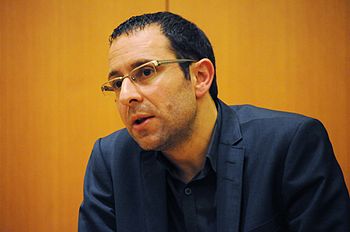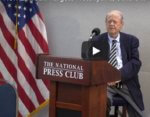Palestinians mount hunger strike campaign against administrative detention
As of Sunday August 13, 2023, 14 Palestinian political prisoners have joined an open-ended hunger strike in protest of their administrative detentions in Israeli military prisons.
They are demanding their freedom, having suffered under indefinite imprisonment without charge or trial.
This strike, which follows a long tradition of Palestinians’ resistance to Israeli theft of life and freedom through administrative detention, also comes only months after the death of Palestinian political prisoner Khader Adnan. Adnan, 45, died at the hands of Israeli occupation forces while carrying out a hunger strike and demanding freedom from the charges levied against him by the Israeli forces.
It was his fifth hunger strike over various periods of imprisonment.

For some of those striking, this is also not their first time taking up a hunger strike in order to demand freedom from political imprisonment at the hands of Israeli forces.
Among those striking is Kayed Fasfous, 34, from Dura, whose name might be familiar as he was successful less than two years ago in his hunger strike of 131 days, having secured his release after sacrificing his health. Fasfous had been held under indefinite administrative detention without charge or trial. Formerly a bodybuilder, Fasfous lost approximately 45 kg (99 pounds) while on hunger strike, illustrating the intense toll this drastic measure takes on the prisoners and the lengths they must go to win something they deserve – freedom.
Administrative detention is an Israeli policy which facilitates the indefinite detention of Palestinian prisoners without charge or trial. Often using the justification of “secret evidence” – or no justification at all – the Israeli military courts continuously extend the period of imprisonment for months at a time while Palestinians are left with no recourse to justice.
Touted as a tactic to maintain Israeli “security”, administrative detention is the literal theft of Palestinian life through alternative means, trapping thousands of Palestinians each year in jail cells. It is also a meaningful threat in attempt to dissuade Palestinians from resisting the status quo of zionist settler-colonialism, as administrative detention can serve as a black hole that divides an individual from their family, community, and resources. Since 1967, approximately 40% of Palestinian men have been arrested, demonstrating the far-reaching nature of the threat of administrative detention. Today, of the approximately 5,000 Palestinian prisoners in Israeli military prisons, about 1,100 are suffering under administrative detention.
The mere fact that Palestinians are able to successfully negotiate their release, time and again, through the public act of hunger striking underscores the injustice at the heart of administrative detention and its farcical explanations. There is no justice under zionism, and no guarantee of freedom while Israeli settler-colonialism continues.
As Palestinian prisoners routinely exhibit, to gain what we deserve, we must be willing to put our own resources on the line in order to resist Israeli settler colonialism. It is essential that we stand with Palestinian prisoners and support them in this struggle, as well as the larger struggle to end administrative detention and decolonize Palestine. You can learn more about this strike and how to take action here, through Samidoun, the Palestinian prisoner solidarity network.
From what we understand, more and more Palestinian prisoners continue to join this collective strike from prisons across Palestine as the information is circulated – slowly, as a result of the work done to isolate prisoners. Below are the names of the men confirmed to be taking part in the collective hunger strike.
-
- Osama Daqrour, Salfit
- Yazan Hanaisha, Qabatiya
- Hadi Naji Nazzal, Qabatiya
- Mohammad Tayseer Zakarneh, Qabatiya
- Anas Ahmad Kamil, Qabatiya
- Abdel Rahman Iyad Baraqa, Aqabat Jaber camp
- Mohammad Bassem Ikhmeis, Beit Ummar
- Zuhdi Talal Abido, al Khalil
- Sultan Khallouf, Burqin
- Kayed Fasfous, Dura
- Saif Hamdan, Nablus
- Osama Khalil, al Faraa camp
- Salah Rabaya, Jenin
- Qusai Khader, al Amari camp
Support the work on the ground in Palestine
Only through people like yourself who are willing to give $5, $10, $20, and $50 dollars a month can we do this essential work on the ground. Your donations ensure we have the capacity and money to buy and plant olive trees in the communities most at risk. Your financial investments allow us to work with local groups to develop their technical and communication needs.
Please consider becoming a monthly donor. If you can’t commit to monthly donations, please consider making a one-time donation to support the work on the ground in Palestine.


- Israelisnipers shooting and killing hospital workers in Gaza - December 11, 2023
- CAIR Condemns Israeli Executions of Wounded, Unarmed Palestinian in West Bank - December 11, 2023
- Arab and Muslim American voters face a “simple choice” between Biden’s inhumanity and Trump’s edgy politics - December 9, 2023

























